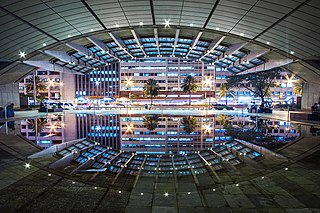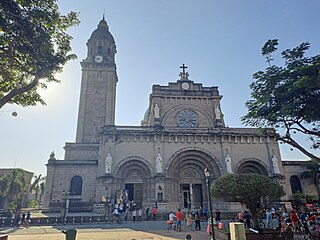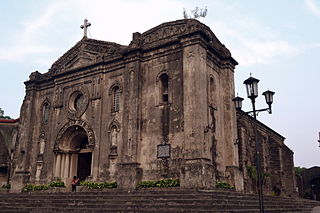
Makati, officially the City of Makati, is a highly urbanized city in the National Capital Region of the Philippines.

Taguig, officially the City of Taguig, is the fourth-most populous city in the Philippines with a population of 1.2 million people. The city is located alongside the northwestern shores of Laguna de Bay in Metro Manila, Philippines. Taguig is known for Bonifacio Global City, one of the leading financial centers of the Philippines. Originally a fishing village during the Spanish and American colonial periods, it experienced rapid growth when former military reservations were converted by the Bases Conversion and Development Authority (BCDA) into financial centers and mixed-use planned communities. Taguig became a highly urbanized city with the passage of Republic Act No. 8487 in 2004, which was ratified by a plebiscite.

The Archdiocese of Manila is the archdiocese of the Latin Church of the Catholic Church in Metro Manila, Philippines, encompassing the cities of Manila, Makati, San Juan, Mandaluyong, Pasay, and Taguig. Its cathedral is the Minor Basilica and Metropolitan Cathedral of the Immaculate Conception, also known as the Manila Cathedral, located in Intramuros, which comprises the old city of Manila. The Blessed Virgin Mary, under the title Immaculate Conception, is the principal patroness of the archdiocese.

Gabriel Martelino Reyes was the 28th archbishop of Manila, and the first native Filipino to hold that post. He previously served as Archbishop of Cebu from 1934 to 1949, and then served as Archbishop of Manila from 1949 till his death in 1952.

Guadalupe station is an elevated Metro Rail Transit (MRT) station located on the MRT Line 3 (MRT-3) system in Makati. It is named because of its location between the barangays of Guadalupe Nuevo and Guadalupe Viejo, both are in turn named after Our Lady of Guadalupe.

The Augustinian Province of Sto. Niño de Cebu, based in the city of Cebu in the Philippines, is a geographical and administrative subdivision of the religious Order of St. Augustine. The Province is actively involved in education, parish administration, mission work and formation of candidates for religious life. It has worked on joint missions with other Augustinian provinces, namely, the Australian Province in South Korea, the Dutch Province in Indonesia, and the Provinces of Villanova, Ireland and England-Scotland in South Africa. In keeping with its goal to become a missionary Province, it has begun sending friars overseas to help in apostolic and pastoral ministries.

Ramón Cabrera Argüelles, D.D., S.T.L. is a Filipino cleric who served as Archbishop of the Metropolitan Archdiocese of Lipa in the province of Batangas on the island of Luzon, Philippines from 2004 to 2017. Prior to his appointment as archbishop, he was an auxiliary bishop of the same diocese, appointed to that position on November 26, 1993.

Francisco Capiral San Diego was the Bishop-Emeritus of the Diocese of Pasig, a suffragan of the Archdiocese of Manila in the Metro Manila region of the Philippines.

The Nuestra Señora de Gracia Church, also known as Guadalupe Church, is a Baroque Roman Catholic church in Makati City, Philippines. The parish church and its adjacent monastery are currently administered by the Augustinian friars of the Province of Santo Niño de Cebu. The territory of the parish covers San Carlos Seminary, the major seminary of the Archdiocese of Manila and Our Lady of Guadalupe Minor Seminary. The church also has an adjacent seminary, the Monasterio de Guadalupe, which admits young professionals for priestly and religious vocation. The current parish priest is Danilo M. Carido.

Poblacion is an administrative division of southern Metro Manila, the Philippines. It is an urban barangay of Makati, named and centered on the city's historic poblacion area and serves as the second most important commercial center in Makati behind the Makati Central Business District. It is also the city's center of government, culture, history and entertainment and a major business district of Metro Manila.

Colegio de Sta. Rosa - Makati, also referred to by its acronym CSR - Makati is a private Catholic institution of learning, run by the Congregation of the Augustinian Recollect Sisters in Rockwell, Makati in the Philippines.

J. P. Rizal Avenue, also known as J. P. Rizal Street, is a major local avenue in Makati and Taguig, Metro Manila, Philippines. It is a contour collector road on the south bank of the Pasig River that runs east–west from Pateros Bridge at the Taguig–Pateros boundary to its intersection with Zobel Roxas, Delpan, and Tejeron Streets at the Makati–Manila boundary. The avenue was named after the Philippines' national hero, Dr. José P. Rizal.

Kalayaan Avenue is a major east–west route in Makati and Taguig, Metro Manila, Philippines. For most of its length, it runs parallel to Jose P. Rizal Avenue to the north from East Rembo near Fort Bonifacio to Barangay Singkamas by the border with Santa Ana, Manila. It is interrupted by Bel-Air Village between Rockwell Drive and Epifanio de los Santos Avenue (EDSA). The avenue east of EDSA is designated as a component of National Route 190 of the Philippine highway network.

The Ermita de San Nicolas de Tolentino is a Roman Catholic chapel located along J.P. Rizal Avenue Extension in Barangay West Rembo, Taguig, Philippines. It was formerly part of Pateros and Makati.

Guadalupe Nuevo is one of the 23 barangays of Makati, Metro Manila, Philippines and belongs to its second legislative district. It is surrounded by EDSA and the Pasig River to the north, barangays Pinagkaisahan in Makati and Pitogo in Taguig to the south, Taguig's barangays Cembo and South Cembo to the east, and Makati's barangay Guadalupe Viejo to the west. It is the easternmost barangay in Makati since the Embo barangays were transferred to Taguig in 2023 as a result of the Makati–Taguig boundary dispute resolution. The Guadalupe MRT station is located along the barangay's boundary with Guadalupe Viejo. Various terminals of jeepney routes are also located in this barangay, thus the area is a transport hub. The old headquarters of Metropolitan Manila Development Authority is found in this barangay.

Mylo Hubert Claudio Vergara is a Filipino bishop of the Catholic Church. He is the second and current Bishop of Pasig since 2011, Vice President of the Catholic Bishops' Conference of the Philippines since 2021, and the Apostolic Administrator of the Diocese of San Pablo since 2023. He had previously served as the third Bishop of San Jose from 2005 to 2011.

Makati's 2nd congressional district is one of the congressional districts of the Philippines in the cities of Makati and Taguig. It has been represented in the House of Representatives of the Philippines since 1998. It is one of the two districts comprising Makati and, following the Makati–Taguig boundary dispute, as one of the three districts comprising Taguig. The district consists of eastern Makati barangays of Guadalupe Nuevo, Guadalupe Viejo, and Pinagkaisahan, along with the northwestern Taguig barangays of Cembo, Comembo, East Rembo, Pembo, Pitogo, Post Proper Northside, Post Proper Southside, Rizal, South Cembo and West Rembo, collectively known as the Embo barangays that were part of Makati until 2023. It is currently represented in the 19th Congress by Luis Jose Angel Campos Jr. of the Nationalist People's Coalition (NPC).

The Makati–Mandaluyong Bridge is a four-lane road bridge crossing the Pasig River in Metro Manila, the Philippines. It connects P. Burgos Extension, a continuation of Makati Avenue in Barangay Poblacion, Makati at the south bank of the river to Coronado Street in Barangay Hulo, Mandaluyong at the north bank. The bridge was opened in 1986.

Embo, which stands for Enlisted Men's Barrio, refers to a collective term for ten barangays in Taguig, Philippines. The barangays were originally established to house military personnel of the Armed Forces of the Philippines (AFP). The area were formerly disputed between the cities of Makati and Taguig, as well as the municipality of Pateros. As of November 2023, the barangays were transferred from Makati to Taguig.



















